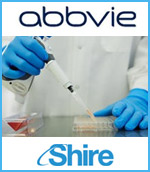Five things for pharma marketers to know: Thursday, October 16
AbbVie board recommends against Shire deal; consultancy says Netherland’s generic bias hampers branded drug sales; Genentech and BI score FDA approval for fatal lung disease.
Shareholders still have to vote, but AbbVie’s board is encouraging them to walk away from the $55 billion Shire acquisition. The decision comes one day after AbbVie jolted Wall Street with the news it was considering changing or abandoning the deal almost three months after announcing the merger. AbbVie cited new US tax inversion rules for its decision, saying, “The changes eliminated certain of the financial benefits of the transaction, most notably the ability to access current and future global cash flows in a tax-efficient manner as originally contemplated in the transaction.” The new rules were intended to stem the flow of what were viewed as superficial relocations that allow companies to pay less in taxes while still materially benefiting from a US presence. The Wall Street Journal notes that the board’s decision is “a win for the Obama administration, which raised a ruckus this summer about overseas merger deals, known as inversions, that help the corporate buyer avoid US taxes.” Shire’s published response was brief: the company said the board “is considering the current situation and a further announcement will be made in due course.”
The Netherlands’s emphasis on generics is slowing pharmaceutical market growth, reports consultancy group GlobalData. The firm says the government’s focus on using generics to contain costs means the pharma market value will crawl from $6.7 billion in 2014 to $7.2 billion by 2020. Tools promoting generic use include pharmacy-level swaps of generics for brands and electronic prescribing systems “through which the brand name of a drug automatically converts to the [non-proprietary, or INN] name,” says Joshua Owide, director of GlobalData’s healthcare dynamics unit. Owide also notes that reimbursement for non-preferred drugs requires a doctor verify that there is a medical need for the medication.
An experimental Novartis drug has a 90% success rate among what Reuters describes as “last-resort leukemia patients.” Known as CTL019, the drug is being tested among acute lymphoblastic leukemia patients and is on an expedited Breakthrough Therapy review track for the condition, also known by the shorthand ALL. CTL019 is also being tested as a treatment for chronic lymphocytic leukemia and Hodgkin’s lymphoma. “If this has curative potential—which we don’t know yet, but seems to be the case—it’s a game-changer,” researcher Michael Sadelain told Reuters. The drug works by reprogramming a patient’s extracted T-cells to seek out cancer-cell proteins, a process that costs around $25,000. Reuters notes that the drug comes with some risks, among them cytokine release syndrome, which is a reaction to the “mass killing of tumor cells” and can be life-threatening.
Genentech and Boehringer Ingelheim announced Wednesday that the FDA has approved two treatments for idiopathic pulmonary fibrosis. Genentech’s Esbriet (pirfenidone) and BI’s Ofev (nintedanib) are the first two treatments to be approved for the fatal lung disease, which affects 100,000 Americans each year. The wholesale price for Esbriet is expected to be $94,000 a year, or $7,800 per month, according to The New York Times. Boehringer Ingelheim will not disclose the price until the drug becomes available in 10 days.
Johnson & Johnson’s Janssen announced Thursday that it would expand its drug development collaboration with Aduro Biotech. The new deal will give Janssen exclusive worldwide license to a number of products from the California-based biotech in lung cancer and certain other cancers using its LADD immunotherapy platform. Aduro will receive a $30 million upfront payment and is eligible to receive milestone payments up to a total of $817 million.







